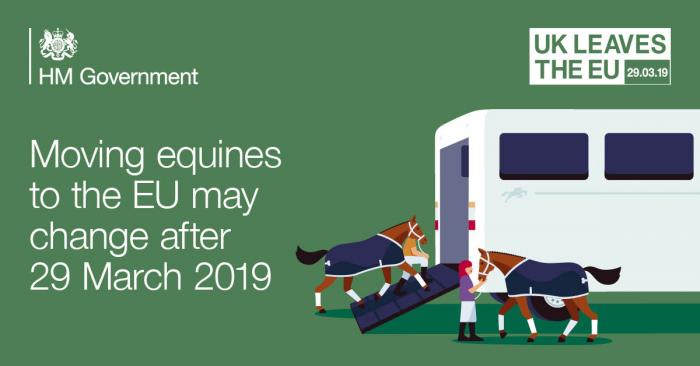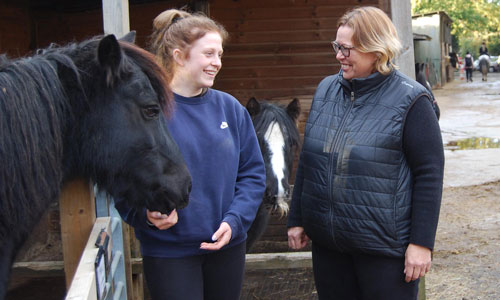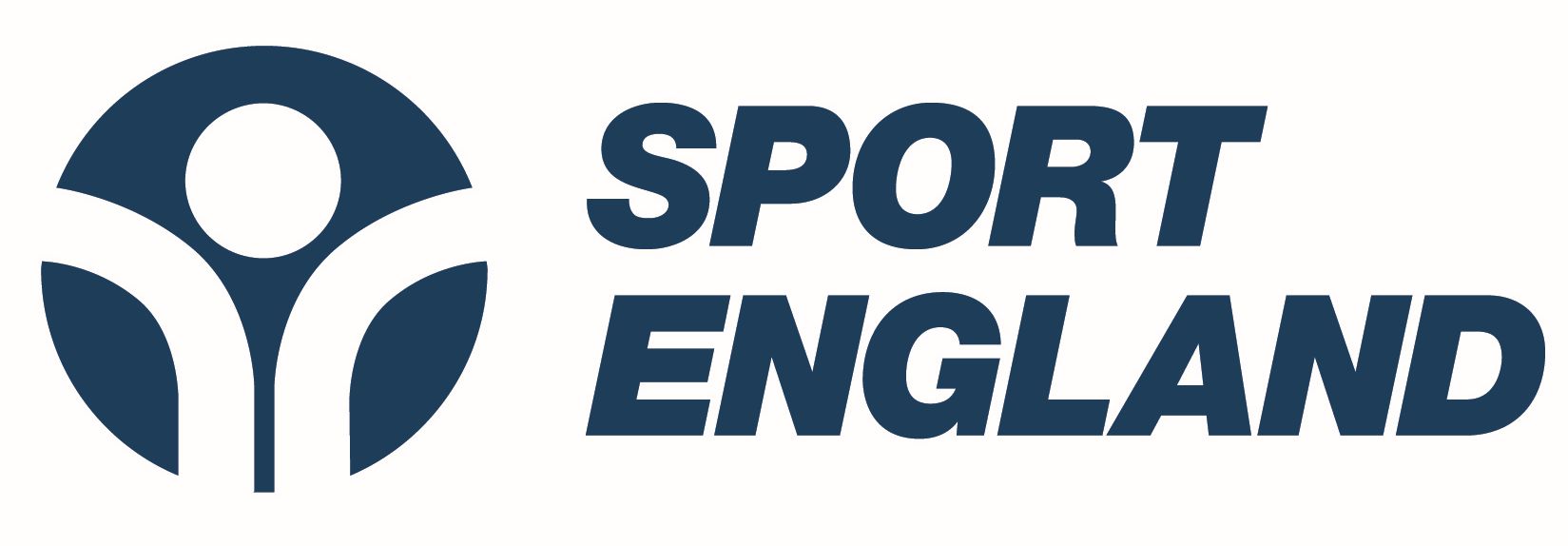- Join Us
- Login
- EEA ToolKit
- Employment Essentials
- Frequently asked
- Contracts and wages
- Time off work & absence
- Staff management & training
- Workplace disputes
- Dismissals and resignations
- Pregnancy and children
- Avoiding discrimination
- Redundancy and Retirement
- Other responsibilities
- Legal Helpline
- Recruitment
- Good Recruitment
- New starters
- Find a groom
- Good Employment
- Resources
- Downloads Library
- EEA Pension & Payroll
- Safe workplace
- Employers Minds
- Transporting horses
- Riding Establishment Licences
- Member discounts
- Business Hub
- Equestrian businesses
- The business plan
- Business compliance
- My clients
- Livery Contract Creator
- Financial matters
- Business challenges
- Marketing
- The EEA
- Employers Life
- Contact

Brexit and affects on transporting horses
25th February 2019
The UK Government has issued advice to equine owners and equine businesses to explain how the process for moving equines from the UK to EU countries would change after 29 March 2019 if the UK leaves the EU without a deal in place.
Owners will need to take steps to prepare for a potential no deal and should consult a vet at least six weeks ahead of when they are intending to move their equine to the EU.
This is because if the UK leaves the EU without a deal, the UK will automatically become a third country after 29 March. Depending on the type of third country the UK becomes, equines entering the EU from the UK will be required to undergo blood tests within 30 days or less of travel to prove the absence of certain diseases.
There would also be changes to the documentation required for an equine to move to the EU from the UK. If the UK is not granted listed status and becomes an unlisted third country, then no equines will be able to move from the UK to the EU.
For the latest guidance from Defra click here.
FAQ’s
What will I need to do differently after 29 March to move my equine from the UK to the EU (incl. horses, ponies and donkeys)?
If the UK leaves the EU without a deal, then equine owners will be required to make sure that their animal meets the requirements for travelling to the EU from a third country, as we will no longer be a part of the EU.
This means that owners will need to make sure all equines being moved to the EU from the UK:
- are tested for the absence of certain diseases within 30 days or less of their travel date;
- meet the residency and isolation requirements of movements to the EU from a listed third country;
- have the right documentation for travel, which will be an Export Health Certificate and in some cases a Government issued ID document
enter the EU via a Border Inspection Post (BIP)
Will this mean increased costs for owners?
The testing requirements and additional veterinary time needed to prepare an equine for travel are likely to result in additional costs for owners. Exact costs will vary between vet practices.
There will be no cost for the identification document, where this is needed.
There is no charge for the Export Health Certificate, but you may be charged for any additional veterinary time.
What will the blood testing requirements be?
The testing requirements are dependent on which Sanitary Group the UK is placed in as a listed country. In order to be prepared for the most likely outcomes to this decision, we advise owners to consider testing for both A and B Sanitary Group requirements to make sure equines can be moved after 29 March.
If the UK is put in Sanitary Group A, equines will need tests for:
• equine infectious anaemia within 30 days of travel for permanent moves
• equine infectious anaemia within 90 days of travel for temporary moves under 90 days of equines registered on a studbook, pedigree register or with an international body for sporting and competition purposes
• equine viral arteritis within 21 days of travel for uncastrated male equines older than 180 days, unless they meet vaccination requirements
In the event that equine viral arteritis is detected in the UK within 6 months of the equines intended date of departure:
• equine viral arteritis within 21 days of travel for uncastrated male equines older than 180 days, unless they meet other specific vaccine or testing requirements specified in the Model Health Certificate. These can be found in EU Commission Implementing Regulation 2018/659.
If the UK is put in Sanitary Group B, equines will also need blood tests for;
• glanders within 30 days before travel.
• dourine within 30 days before travel for an uncastrated male or a female if they are older than 270 days
When should I consult my vet to start preparations?
It is advised that you contact a vet at least six weeks before you intend to move your equine to the EU to allow sufficient time to prepare.
Do I need to book an Official Vet to carry out the blood tests?
No. Sampling can be carried out by any qualified veterinarian. But blood samples must be sent to the APHA laboratory in Weybridge for analysis.
However, only an Official Vet can authorise your equine for travel and issue the documentation needed for travel.
What will happen if the UK agrees a deal with EU before March 29th?
If the UK agrees a deal with the EU, then the process for moving equines from the UK to the EU will continue in the same way as now, including movements made under the TPA during any agreed implementation period.
What happens if the EU does not provide the UK with a listed status in time?
If the UK is not granted listed status, the UK will automatically become an unlisted third country. In this event, no movement of equines from the UK to the EU would be able to take place.
Will equines that had previously been moved under the TPA need to enter via a Border Inspection Post?
Yes. The requirement would apply to all equines entering the EU, including movements to Ireland and France previously made under the TPA. This is because this is a current EU requirement for all equines entering the EU from a third country.
How will I know which Border Inspection Posts (BIPs) will accept equines? Will a BIP be built at Calais?
The EU lists all BIPs and the products they are approved to handle on its website. This list may be updated prior to 29 March, so you should check regularly for new information
Will I need to pay any additional tariffs?
HMRC have published information relating to the customs processes that will apply to UK imports in the event of a no deal. These can be found on gov.uk.
How do I get an Export Health Certificate?
The EHC will replace the Intra Trade Animal Health Certificate (ITAHC) for exports to EU countries.
Before an EHC can be issued, equines will need to have been tested and found free of certain disease (see above).
For full details on Export Health Certificates and how to get one visit gov.uk.
What documentation do I need for onward travel in the EU?
For each journey the Export Health Certificate should clearly show the equine’s country of destination if this is different to the country of entry.
How do I get the Government ID document?
You will need to contact the Animal and Plant Health Agency (APHA) to get an ID document if your equine is not registered on a recognised studbook or with an international association or sporting body, in order for it to travel to the EU.
The document will be for equines being moved to the EU from the UK and will be additional to the current equine passport.
You will be able to apply for the ID document at the same time as you apply for your equines Export Health Certificate via the form finder.
There will be no charge for the document, which will be valid for a single journey to the EU.
For all the information on how to apply for the ID document visit gov.uk.
Will the Government ID document replace existing equine passports?
No. All equines in the UK will still be required to have the equine passport, as now for domestic identification purposes.
Only some equines will also need a Government ID document in order to travel to the EU. Those equines requiring Government issued ID will be required to travel to the EU with both this document and their equine passport.
How do I know if my equine will need a Government ID document?
Equines registered or a recognised studbook or with an international association or sporting body will be able to use current ID documents to travel.
You will be able to check on gov.uk whether your equine is registered or not.
Will existing studbooks still be recognised after we leave the EU?
It is expected that this will be the case, subject to the UK being listed as a third country.
I’m authorised to transport livestock – what do I need to do to continue to transport equines to the EU after 29 March?
When the UK leaves the EU, the EU will no longer recognise specific transport authorisations issued in the UK that are required for transporting live animals.
Transporters wishing to move live animals from the UK to the EU would need to appoint a representative within an EU country and apply to their relevant Government department to obtain a valid;
- Transporter Authorisation
- Certificate of Competence
- Vehicle Approval Certificate
- In addition, where necessary, journey logs would need to be obtained from the EU country that is the initial point of entry into the EU for export.
- Exporters will need to present their documentation at a Border Inspection Post in the EU.
Will my current UK issued transport documentation still be valid for transport within the UK?
Yes. UK issued transport documentation will still be valid for transport within the UK.
So do I need two sets of documentation?
Yes – UK issued documentation will be valid for transport within the UK only. For exporting live animals to the EU, you will need to obtain additional documentation which is valid for transport within the EU.
What changes will there be for importing equines to the UK from the EU?
In the event of a ‘no deal’, the Intra Trade Animal Health Certificate (ITAHC) used to import live animals and germinal products directly from the EU will be replaced with the UK Health Certificate.
The importer will be responsible for ensuring APHA receives a complete and valid UK Health Certificate for these consignments. In order to do so, importers must notify APHA of the arrival of a consignment who will provide the importer with a Unique Notification Number (UNN).
The UNN should be given to the EU Official Veterinarian who enters the UNN on the UK Health Certificate. The UK Health Certificate should be sent to APHA and a paper copy should travel with the consignment.
There will continue to be no border checks for live animals and germinal products imported directly from the EU.
For horses which currently enter the UK from France using a DOCOM, or travel from Ireland without any animal health documentation, there will be no immediate change to the current entry documentation in the event of a no deal. Importers will, however, need to notify APHA of the arrival of a future consignment.
Importers will also need to comply with UK customs procedures. In some cases importers may want to register for simplified import procedures. Information from HMRC on customs procedures in the event of a no deal exit from the EU are available here.
Owners regularly moving the same equine between the UK and EU may wish to consider applying for an ATA Carnet to further streamline customs procedures.
What will happen to the Tripartite Agreement (TPA) when the UK leaves the EU?
The UK will no longer be a party to the Tripartite Agreement (TPA) when we leave the EU. If the UK leaves the EU without a deal then all equines being moved to the EU will need to meet the same requirements in order to travel.
How will the UK be able to negotiate a replacement for the TPA once we leave the EU?
Government are working closely with the equine industry to develop a longer term replacement for the TPA and will continue to work with the European Commission to negotiate future arrangements for equine movement.
For more information click here.
NEWS ARCHIVE




















-Small.jpg)



-Small.jpg)

